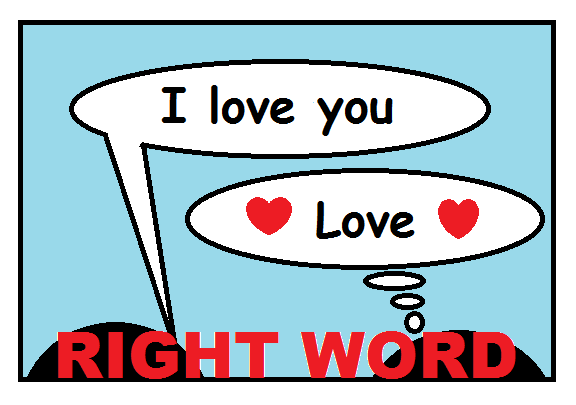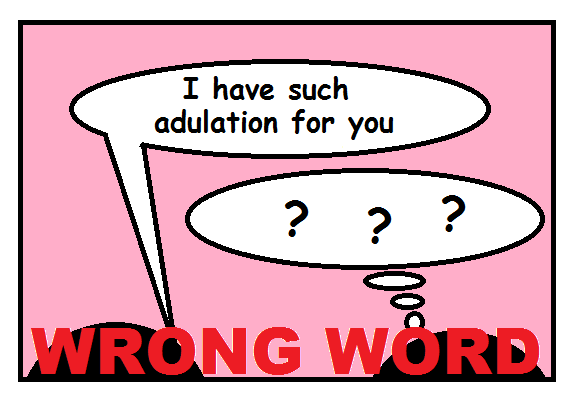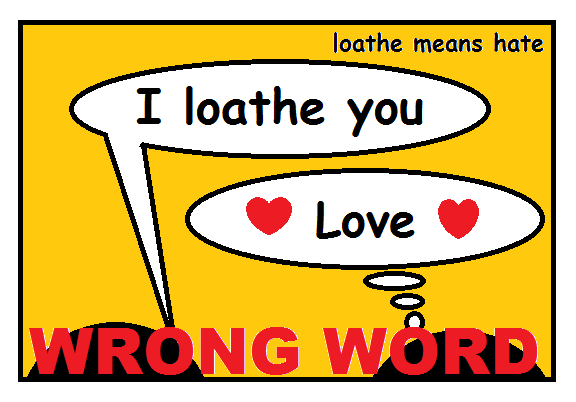
Why is the Bible so hard to understand? Why does there seem to be a disconnect between the Bible and reality? Why is the church out of touch with the world around it? The answer to all of these questions is simple, yet hard to stomach.
We have been using the wrong words. Grace is the wrong word. Faith is the wrong word. Believe, flesh, gospel, righteousness, glory, and a few hundred other Bible words are the wrong words.
Why they are Wrong
Why are they wrong? They are wrong because they do not communicate the correct meaning of the original Greek text of the Bible.
That is a serious accusation, but it is true. Yet Christians, clergy and laymen alike, shrug it off. They don't care. They still want to keep these wrong words that they don't really know. They have a false sense of security in them and that is what they want.
The Bible words they are so comfortable with do not give a clear meaning. Their true meaning is unknown to most people. "If you don't give a clear message, how will it be known what is spoken? You see, you will be people speaking into the air" (1 Corinthians 14:9b from the Breakthrough Version). Using words that do not give a clear message is wrong, especially when dealing with God's message.
The purpose of talking and reading is communication. If the words being used communicate nothing to the listener or if they communicate the wrong meaning, they are wrong.

Words should Communicate Ideas

When a Word Communicates No Idea,
it is the Wrong Word

When a Word Communicates the Wrong Idea,
it is the Wrong Word
When I was a missionary in Russia and my interpreter first used the word, "flat", I didn't know what he was talking about. It meant nothing to me (I knew he was not talking about a flat tire). I later found out that "flat" is the British word for apartment. It communicates a clear meaning to a British person, but not to an American. Flat is the wrong word for an interpreter to use when interpreting for Americans.
Words that do not communicate a clear meaning are the wrong words to use.
Fourteenth Century Words in the Twenty-First Century
This is true of the Bible too. When the Bible is read by people in the twenty-first century, it should not contain fourteenth century words. Grace, faith, flesh, gospel, righteousness, and glory are fourteenth century words.
These words were first used by John Wycliffe in 1395 when he translated the first English Bible from Latin. Back then they were the right words. People used them every day. When people went to the market, they used them. When they whispered words in their loved ones ears, they used them. They were regular words used every day in the fourteenth century. Because of this they gave a clear meaning to them of what the Greek said.
But things have changed. Today they are not regular words because through the centuries those words have changed meaning and been replaced by newer words. It is the newer words that are used at the store, at work, on television, and even in private talk. The old words are not. They are only used in church and in the Bible.
Other words in the Bible also have changed in meaning but are still used in everyday life today WITH A DIFFERENT MEANING. These words do not mean what they originally meant. They are misleading. They do not stand up and yell at the reader, "I don't mean what you think I mean." They are quiet. People read them and get the wrong meaning. Study, believe, reward, messenger, worship, suffer, preach, and tempt are a few of these words. WARNING - THESE WORDS DO NOT MEAN WHAT YOU THINK THEY MEAN.
Today these wrong words present a problem. Not only do unchurched people not understand them, but most churched people also don't understand them. If you don't believe this, just ask people what grace is, or what glory is. I have been doing this for thirty years. You will get very few correct answers. The most common answer will be either, "I don't know" or silence. If they don't understand the words, how will they know what the Bible says to do? "You see, if a trumpet also gave an uncertain sound, who will prepare for war?" (1 Corinthians 14:8 from the Breakthrough Version)
In a recent survey of 12 common Bible words, people did not know the correct meaning of 68% of the words. Whether Christians want to admit it or not, this is a problem.
Using these words actually hides the message of the Bible. Why does the church insist on using words that hide the Bible?
Wrong Word + Right Definition
Some pastors try to correct this by giving twenty-first century definitions for all of the wrong words. That is a step in the right direction but a good definition is no substitute for using the right word.
For six and a half years I taught the correct meanings to the people of one church that I pastored. I even gave them a modern-day synonym for each of the wrong words. I told these meanings to them over and over again. When I asked them at the end of that time what those words meant, they did not know.
Recently I went to a church where the pastor preached on salvation. He explained the word believe. He gave a long definition of believe and said that he would explain it later in the sermon. He later came back to it and eventually said that it means trust (among other words). He was correct, believe in the Bible is trust. But he continued to use the word, believe, over and over again. If it means trust, shouldn't he be saying trust and not believe? Even the Bible verse on the screen behind him said believe, not trust. Did anyone in the auditorium realize that they must trust Jesus in order to be saved? I don't think so.
Use the Right Word
The solution is simple. Start using the right words. Use "trust" for "faith" and "believe". Use "generosity" for "grace". Use "the right way" for "righteousness". Use "physical body" for "flesh". Use "good news" for "gospel". Use "magnificence" for "glory".
I spent over thirty years in study and research discovering the right words. I have compiled those words in a literal translation of the New Testament. It is called the New Testament - Breakthrough Version. Two years later, I published the New Testament - Breakthrough KJV for those you want a modern literal translation of the Textus Receptus.
The Breakthrough Version is easy-to-understand, educational and eye-opening. But best of all, it is in your words. You don't need a Bible dictionary, a seminary degree, or years of going to church in order to understand it. Just read it.
It is time for our churches and the Bible to join the twenty-first century. Help it do so by using the right words.
